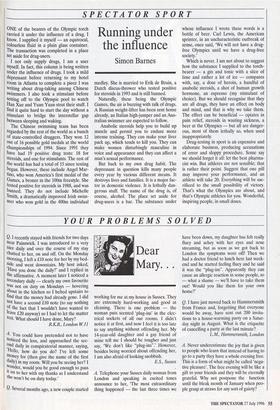SPECTATOR SPORT
Running under the influence
Simon Barnes
ONE of the bearers of the Olympic torch carried it under the influence of a drug. I know. I supplied it myself — an equivocal, colourless fluid in a plain glass container. The transaction was completed in a place set aside for drug-users.
I not only supply drugs, I am a user Myself. In fact, this column is being written under the influence of drugs. I took a mild depressant before returning to my hotel room in Atlanta to complete a piece I was writing about drug-taking among Chinese swimmers. I also took a stimulant before setting off to the Olympic pool to watch Han Xue and Yuan Yuan strut their stuff. I find it quite hard to start the day without a stimulant to bridge the interstellar gap between sleeping and waking.
The Chinese swimming team has been regarded by the rest of the world as a bunch of state-controlled druggers. They won 12 out of 16 possible gold medals at the world Championships of 1994. Since 1991 they have had 19 positive drug tests: 18 for steroids, and one for stimulants. The rest of the world has had a total of 15 since testing began. However, these include Angel Mar- tino, who won America's first medal of the Games, a bronze in the 100m freestyle. She tested positive for steroids in 1988, and was banned. They do not include Michelle Smith, a dramatically improved Irish swim- mer who won gold in the 400m individual medley. She is married to Erik de Bruin, a Dutch discus-thrower who tested positive for steroids in 1993 and is still banned. Naturally, these being the Olympic Games, the air is buzzing with talk of drugs. A Russian weight-lifter has been sent home already, an Italian high-jumper and an Aus- tralian swimmer are expected to follow.
Anabolic steroids help you to build up muscle and permit you to endure more intense training. They can make your liver pack up, which tends to kill you. They can make women disturbingly masculine in voice and appearance and they can affect a man's sexual performance.
But back to my own drug habit. The depressant in question kills many people every year by various different means. It destroys lives and families. It is a major fac- tor in domestic violence. It is lethally dan- gerous stuff. The name of the drug is, of course, alcohol. The place set aside for drug-users is a bar. The substance under whose influence I wrote these words is a bottle of beer. Carl Lewis, the American sprinter, in an uncharacteristic outbreak of sense, once said, 'We will not have a drug- free Olympics until we have a drug-free society.'
Which is never. I am not about to suggest how the substance I supplied to the torch- bearer — a gin and tonic with a slice of lime and rather a lot of ice — compares with, say, a dose of heroin, a handful of anabolic steroids, a shot of human growth hormone, an espresso (my stimulant of choice). But we should recognise that they are all drugs, they have an effect on body and mind, and that is why we take them. The effect can be beneficial — opiates in pain relief, steroids in wasting sickness, a beer at the Olympics — but all are danger- ous, most of them lethally so, when used inappropriately.
Drug-testing in sport is ah expensive and elaborate business, producing accusations of error and sloppy procedure. Some say we should forget it all: let the best pharma- cist win. But athletes are not sensible; that is rather their point. Suggest that one pill may improve your performance, and an athlete will take 20. Everything will be sac- rificed to the small possibility of victory. That's what the Olympics are about, and that's Olympic athletes for you. Wonderful, inspiring people, in small doses.


























































 Previous page
Previous page